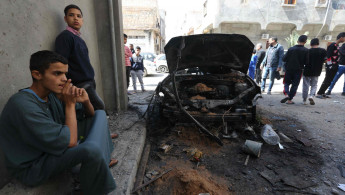Libya shelling kills at least six civilians in Tripoli
The overnight rocket shelling on the high-density residential district of Abu Slim, less than 4.5 miles (7 kilometres), from the city centre, prompted condemnation "in the strongest terms" from the UN envoy for Libya.
"The use of indiscriminate, explosive weapons in civilian areas constitutes a war crime," said Ghassan Salame without naming the shelling source.
Fighting erupted 5 April after the Libyan National Army, led by commander Khalifa Hafter aligned with a rival government in the east, launched an offensive against Tripoli where the UN-backed Government of National Accord, led by Fayez al-Sarraj, is based.
Both sides blamed the other for the shelling, which wounded at least 26 people, according to Malek Merset, a spokesman for the health ministry in Tripoli.
UN spokesman Stephane Dujarric said Wednesday in New York that "in the past 24 hours we've also seen the highest single-day increase in displacement, with more than 4,500 people displaced, and that's according to the International Organization for Migration".
Dujarric said the total number of people forced from their homes was up to 25,000. At least 174 people have been killed and 758 injured, including civilians, since 4 April, according to figures from the World Health Organisation.
"Civilians trapped in conflict areas are reportedly running low on basic food items as well as fuel, and experiencing prolonged electricity and water cuts," he said.
Dujarric also said that on Tuesday the UN refugee agency and its partners relocated 150 refugees who detained in the Abu Selim detention centre - close to the ongoing clashes - to a UN facility in central Tripoli.
Britain has presented a draft resolution to the UN Security Council demanding an immediate ceasefire in Libya, according to the text obtained by AFP on Tuesday.
Hafter has vowed to unify the country after years of chaos following the 2011 uprising that toppled longtime dictator Muammar Gaddafi.
Libya has been riven by divisions since the NATO-backed overthrow of Gadaffi, with various armed groups and two parallel governments vying for territory and oil wealth.
Haftar has led previous campaigns against Islamist militias and other rivals in eastern Libya, and has received support from the UAE, Egypt, Saudi Arabia, Russia and France.
Follow us on Twitter: @The_NewArab




 Follow the Middle East's top stories in English at The New Arab on Google News
Follow the Middle East's top stories in English at The New Arab on Google News
![The UAE is widely suspected of arming the RSF militia [Getty]](/sites/default/files/styles/image_330x185/public/2024-11/GettyImages-472529908.jpg?h=69f2b9d0&itok=Yauw3YTG)
![Netanyahu furiously denounced the ICC [Getty]](/sites/default/files/styles/image_330x185/public/2024-11/GettyImages-2169352575.jpg?h=199d8c1f&itok=-vRiruf5)
![Both Hamas and the Palestinian Authority welcomed the ICC arrest warrants [Getty]](/sites/default/files/styles/image_330x185/public/2024-11/GettyImages-2178351173.jpg?h=199d8c1f&itok=TV858iVg)